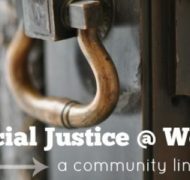Social Justice at Work: Use the Gifts You Have
Blog / Produced by The High Calling
I remember introducing someone to the wide-open world of Google. It was a few years ago, about the time “Google” the proper noun was morphing into “google” the verb, meaning “to search the Internet to find information.”
I forget her name, but I remember her amazement quite clearly. There was an expected bit of sensory overload, mixed with an equal amount of head-spinning at the virtually limitless possibilities. It was something like watching a person who had been blind their whole life able to see for the first time.
The introduction was a result of a community service project by my company in support of National Literacy Month, which happens every September. We held a big book drive at the office, and distributed them to a few organizations that had good programs which encouraged people to read.
My task was to conduct some “digital literacy” training for one of those organizations, Second Chance Last Opportunity (SCLO). Our company (a telecommunications company) was installing high-speed Internet service and donating a few computers for use by at-risk teens, single moms, low-income families, and the homeless in the area. SCLO offers important life management skills programs that teach people things like money management and job readiness. So these Internet-connected computers provided a way to connect with online resources to help them develop a resume, and search online classifieds and job listing websites.
In the short time I had for my workshop, I saw a hunger develop in the people… a hunger for more. I didn’t have the time to teach them how to land a job. However, it seemed more than enough to help them discover the new ways to find one.
With as much as they had going on, I figured that I would need to leave “How to Build a LinkedIn Profile” for a later lesson. For some, Google was just the right amount of information.
I learned a few things that day about integrating my faith with my work, and how to do social justice in the workplace.
1) Social justice issues are everywhere
We often think that we need to go to far-away places like Haiti or Africa to see poverty and social inequality. The truth is that it’s right here in our own neighborhoods. There are always local projects that you and the company you work for can do to be a blessing to your community. And don’t try to reinvent the wheel… find organizations who are already in place that you can come alongside.
2) Use what you have
A project like this one was a no-brainer for me. I know computers. And I know how to train people. Nothing else was needed. We used what we already had to make a difference in another’s life. And it blessed them more that we’ll ever know. (Where’s my Easy Button when I need it?)
3) Do it because you’re a Christian
Sometimes we feel like doing good deeds need to be done with a giant “get saved” banner along with it. Doing social justice doesn’t have to be an evangelistic crusade, but it does have evangelism-related impact. I had plenty opportunity to talk to people there about my church and what I do in ministry too, but my company didn’t have to host a tent revival in the process. The bottom line is that God called us to love people. So do projects like this simply because it’s partially what it means to be a follower of Christ.
Social Justice at Work
When God asks us to take care of the orphan, widow, and the poor, what does that mean for our workplaces? How do we follow a social justice mandate in our offices, schools, warehouses and retail establishments? And how does it change our world when social justice works the way God intended?
In the series Social Justice at Work, The High Calling explores social justice in the places we work and the ways we work. Join us as we discuss how our calling to the "least of these" affects us outwardly in our jobs, and inwardly as we perform our jobs, via theme-related Bible reflections, featured articles, and discussion starters. We encourage you to add your questions, concerns and comments, engage with us on social media (especially Twitter and Facebook), and invite your friends and colleagues to do the same.
This post first appeared at Bible Dude.
Photo and graphics by Jennifer Dukes Lee.





